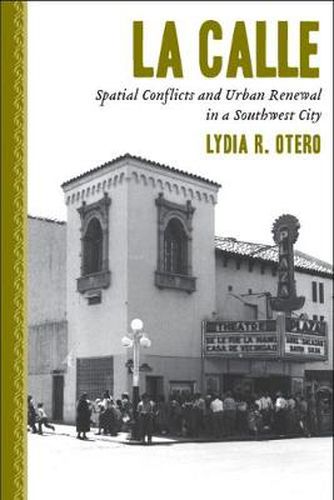Readings Newsletter
Become a Readings Member to make your shopping experience even easier.
Sign in or sign up for free!
You’re not far away from qualifying for FREE standard shipping within Australia
You’ve qualified for FREE standard shipping within Australia
The cart is loading…






On March 1, 1966, the voters of Tucson approved the Pueblo Center Redevelopment Project–Arizona’s first major urban renewal project–which targeted the most densely populated eighty acres in the state. For close to one hundred years, tucsonenses had created their own spatial reality in the historical, predominantly Mexican American heart of the city, an area most called la calle. Here, amid small retail and service shops, restaurants, and entertainment venues, they openly lived and celebrated their culture. To make way for the Pueblo Center’s new buildings, city officials proceeded to displace la calle’s residents and to demolish their ethnically diverse neighborhoods, which, contends Lydia Otero, challenged the spatial and cultural assumptions of postwar modernity, suburbia, and urban planning. Otero examines conflicting claims to urban space, place, and history as advanced by two opposing historic preservationist groups: the La Placita Committee and the Tucson Heritage Foundation. She gives voice to those who lived in, experienced, or remembered this contested area, and analyzes the historical narratives promoted by Anglo American elites in the service of tourism and cultural dominance.
La Calle explores the forces behind the mass displacement: an unrelenting desire for order, a local economy increasingly dependent on tourism, and the pivotal power of federal housing policies. To understand how urban renewal resulted in the spatial reconfiguration of downtown Tucson, Otero draws on scholarship from a wide range of disciplines: Chicana/o, ethnic, and cultural studies; urban history, sociology, and anthropology; city planning; and cultural and feminist geography.
$9.00 standard shipping within Australia
FREE standard shipping within Australia for orders over $100.00
Express & International shipping calculated at checkout
Stock availability can be subject to change without notice. We recommend calling the shop or contacting our online team to check availability of low stock items. Please see our Shopping Online page for more details.
On March 1, 1966, the voters of Tucson approved the Pueblo Center Redevelopment Project–Arizona’s first major urban renewal project–which targeted the most densely populated eighty acres in the state. For close to one hundred years, tucsonenses had created their own spatial reality in the historical, predominantly Mexican American heart of the city, an area most called la calle. Here, amid small retail and service shops, restaurants, and entertainment venues, they openly lived and celebrated their culture. To make way for the Pueblo Center’s new buildings, city officials proceeded to displace la calle’s residents and to demolish their ethnically diverse neighborhoods, which, contends Lydia Otero, challenged the spatial and cultural assumptions of postwar modernity, suburbia, and urban planning. Otero examines conflicting claims to urban space, place, and history as advanced by two opposing historic preservationist groups: the La Placita Committee and the Tucson Heritage Foundation. She gives voice to those who lived in, experienced, or remembered this contested area, and analyzes the historical narratives promoted by Anglo American elites in the service of tourism and cultural dominance.
La Calle explores the forces behind the mass displacement: an unrelenting desire for order, a local economy increasingly dependent on tourism, and the pivotal power of federal housing policies. To understand how urban renewal resulted in the spatial reconfiguration of downtown Tucson, Otero draws on scholarship from a wide range of disciplines: Chicana/o, ethnic, and cultural studies; urban history, sociology, and anthropology; city planning; and cultural and feminist geography.